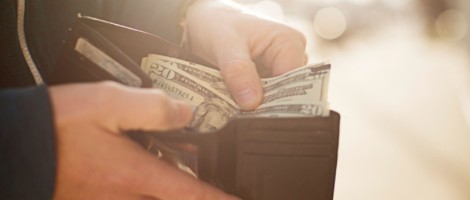If your wallet is like mine, it’s easier to put things into it than take them out. I also find that I want to have all the important personal information with me – just in case. My overly-stuffed wallet sends a message that I have a lot of cash or – these days – credit and debit cards in my wallet. Not that the ladies are exempt – in a store not long ago, I watched a lady dig through a plethora of cards to find the one that had enough credit on it (that’s a subject for another article) to buy what she wanted. Had I slipped one of those cards out of her stack, she would have never missed it until she got the bill.
Even a casual observation will tell you that most folks carry too many credit cards. It’s not that you are looking in their wallet or purse; it’s just that you can’t not see them as they fish for the one they want. Most financial advisors suggest that you carry only one credit card and perhaps a backup. For me, American Express is the primary card I carry (because it pays me back) but there are some places that won’t accept that card, so I also carry a Visa card. If my wallet is lost or stolen, I have only two card companies to notify, instead of six or eight. If you’ve ever had to replace a stolen card, you know what a hassle it can be, especially if you have auto pays attached to it. A 2015 survey by Experian, a credit reporting agency, found that 47% of customers fail to remove extra cards from their wallets when they travel – don’t be one of them.
Another important document that ought not to be in your wallet is your Social Security card. Your Social Security number is the single most important piece of information that identity thieves need to make a credit clone of you. With it, they can use your credit history to apply for credit cards in your name. They can even file for an income tax refund that should be yours and do some other things that will not make you want to add them to your Christmas card list. If your number is stolen and used, getting a new one is possible but not easy. Even then, some financial institutions and government agencies may still associate you with your old number.
A few of us still write checks. Don’t carry the whole check book. A thief can write more checks on your account in five minutes than you write in a year. Yes, you can put a stop payment on each one, if you are quick – at a cost of about $25.00 to $35.00 each -- and you can close the account and open another, but you’ll have to wait for new checks and debit cards to arrive before you can go on another spending spree.
If you are one that carries around a lot more cash than you’ll ever spend – stop! The problem with losing cash is that you can’t get it back – after a thief spends it, you can’t prove that it was yours; unlike with credit cards and checks where you have some opportunity to prove that you didn’t make the charge or write the check.
While there are some important documents that you need to carry with you – driver’s license, one or two credit or debit cards, business ID’s, etc., take time to look through your wallet or purse and see if there are some things you could leave at home. The identity you save might be your own!
The Texas Baptist Mission Foundation takes your identity protection very seriously. We work to ensure very gift given through TBMF is secure and protected. As a Certified Financial Planner, I would be glad to visit you with about more tips on identity protection and other helpful saving and giving tips. You can reach me by calling 214-828-5343 or emailing bill.arnold[at]texasbaptists.org.
Strengthening a multiplying movement of churches to live out the Great Commandment and Great Commission in Texas and beyond.
The ministry of Texas Baptists is made possible by giving through the Texas Baptists Cooperative Program, Mary Hill Davis Offering® for Texas Missions, Texas Baptists Worldwide and Texas Baptist Missions Foundation. Thank you for your faithful and generous support.
Subscribe to receive stories like this one directly to your inbox.
We are more together.
